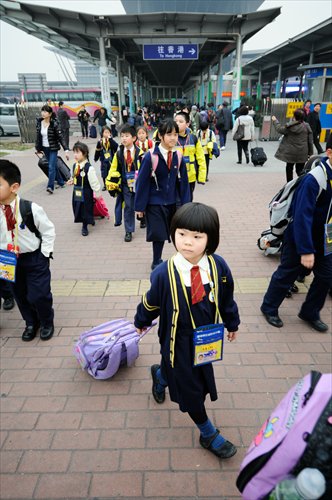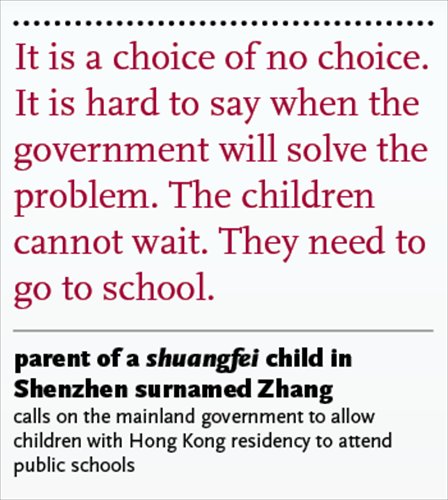Mainland children born in HK exhausted by 5-hour daily commutes to school
From 2001 to 2012, more than 200,000 children were born in Hong Kong - almost all of whom have Hong Kong residency - to parents who are Chinese mainland residents. Not eligible to attend public schools in the mainland, many of these children have to cross the border every day for school. Stuck in the middle, they seem doomed to suffer exhausting, several hour-long daily commutes just to get education.

Shuangfei children cross the border between Shenzhen and Hong Kong on their way to school. Photo: IC
Choosing a school for their children is a stressful decision for any parent. For a Shenzhen resident surnamed Zhang, her second child's only chance for an education lies across the border in Hong Kong.
Her daughter was born in Hong Kong in 2010, making her one of the more than 200,000 mainlander "shuangfei" (a term which refers to these children's parents and literally translates as "pair of non-Hong Kong residents") children born in Hong Kong. Zhang is now anxiously waiting to hear at which school her daughter has been allocated a place.
"Hong Kong primary schools only set aside 8 percent of the overall enrollment quota for children like mine. If we're unlucky, my daughter will have to go to a bad school," Zhang shared with the Global Times, arguing that this "lottery" arrangement represents Hong Kong's "discrimination" against this group of children.
But she still feels grateful that her daughter can go to a Hong Kong primary school, regardless of its quality. She has virtually no chance of going to a school in the mainland.
Since her daughter has the right of abode in Hong Kong and does not have a mainland hukou (household registration), she is not able to enjoy free education in Shenzhen's public schools. Shenzhen's private schools are too expensive for average middle-class families like Zhang's.
The number of students that cross from the mainland to Hong Kong reached 30,000 in 2015 and this number is expected to peak from 2016 to 2018 at 65,000 to 85,000.
"Before making our decision to send her to a Hong Kong school, we thought about sending her to a public school in Shenzhen. If that was possible, it would mean we could have more time with the children, without her crossing borders every day. But we don't have the chance," said Zhang.
An optimistic person, Zhang is trying to look on the bright side, focusing on the advantages of Hong Kong's kindergartens. But what they are doing is their only choice.
"It is a choice of no choice," said Zhang, "It is hard to say when the government will solve the problem. The children cannot wait. They need to go to school."

A hard choice
In the past three years, Zhang has been traveling to and from Hong Kong every day to take her daughter to kindergarten. She said she is relatively lucky as she lives near the border, but it still takes around three hours every day and her daughter doesn't get enough rest. "It is rather hard for children," said Zhang, adding that it is common for children that live further from the border to spend four or five hours a day traveling.
Hoping to end this exhausting daily ritual, Zhang researched public schools in Shenzhen. She discovered that her daughter will have to go to a "private school built for children from Hong Kong or another private school." In 2012, the Shenzhen education bureau banned local public schools from enrolling students that are registered residents of Hong Kong or Macao.
Even if so, the decision to send her daughter to school in Hong Kong was not made lightly. "Once you choose this path, you need to stick to it until the end," Zhang told the Global Times. "There is no way back."
Since the mainland and Hong Kong use different education systems, including the language of instruction and whether the child learns traditional or simplified Chinese characters, it would be very challenging for a child to switch midway through their primary or middle school curriculum.
Because Zhang's oldest child is studying in Shenzhen, it is not possible for the whole family to move to Hong Kong and rent an apartment there. Once it starts, Zhang - who quit her job when her daughter was born and is unable to work currently due to the long daily commute - will live this life for at least 10 years.
There are also potential problems the family is yet to face. Zhang said her daughter has not mentioned anything about discrimination against her yet, "maybe because they are too little to have this concept." But there has been no shortage of media reports about shuangfei children being discriminated against in Hong Kong's school.
A forum post on Shenzhen-based szhome.com described how the poster's friend's daughter was called "mainland girl" by her Hong Kong kindergarten classmates, who shun her because she cannot speak Cantonese.
This kind of discrimination comes against the backdrop of heightened tensions between Hong Kong locals and mainlanders.
In 2012, a newspaper in Hong Kong published an editorial entitled "Hong Kong people have had enough!" which protested pregnant women from the Chinese mainland giving birth in Hong Kong, and implied mainlanders are locusts.
There have also been demonstrations against "parallel traders" who cross the border from the mainland daily to buy goods that are relatively cheaper in Hong Kong, creating shortages in the city.
Coming back
In 2010, Zhang gave birth in Hong Kong simply to avoid paying a fine for breaking the one-child policy. However many mothers head to Hong Kong so their children can enjoy the region's more generous welfare policies.
But not all parents understood the consequences of this choice at the time. In recent years, more and more are talking about going back to Shenzhen in online forums.
Zhong, a mother in Shenzhen who sent her daughter to Hong Kong kindergarten for half a year, decided to enroll her child in a private Shenzhen kindergarten because "even though kindergarten education in Hong Kong is mature," she felt it is was not worth the hardship she and her child experienced.
According to Zhong many parents like her now regret their decision and want their shuangfei children to be educated in Shenzhen.
"They realize that Hong Kong is not a utopia. In Hong Kong, competition is fierce and students are under great pressure," said Zhong, "Many have imagined too beautiful a life in Hong Kong. The reality is cruel."
But there is no clear path back. While the public schools in Shenzhen only accept students with mainland hukou, there is no clear guideline yet for these children to get a Shenzhen hukou.
Officers at a police station in Nanshan district, Shenzhen told the Global Times Tuesday that they cannot register hukou for children who already have a Hong Kong or Macao identity. But it remains unclear whether these children can give up their Hong Kong identity.
A parent told Southern Weekly that she was told by a police station in Shenzhen that children have to give up their Hong Kong identity first. But the Immigration Department of Hong Kong told her that "in the current Hong Kong law, there is nothing about giving up Hong Kong residency."
In January 2015, it was reported that the relevant departments in Hong Kong and the mainland were discussing a "return mechanism" for shuangfei children, but no progress on this matter has been announced.
Some parents have made it clear online that they would be willing to pay the fines they worked hard to avoid by going to Hong Kong in the first place, if it would mean their children could go to school in Shenzhen.
"Now they want to go back, they cannot make it," said Zhong.
Exploring the solution
Zhang told the Global Times that sometimes she feels that shuangfei children like her daughter have been left to "sink or swim." "No one is helping us but ourselves," said Zhang, "now there is no way back, we can just hope Hong Kong will not make it too hard for us to stay."
Some media reports call this group "sandwiched." On the one hand, the education resources in Hong Kong are limited, so they are not so welcomed by Hong Kong locals. On the other hand, the public in the mainland, particularly Shenzhen, don't welcome them back either for the same reason. A netizen submitted a post on a local Shenzhen new portal sznews.com in 2014 which supported the government's ban on shuangfei children going to Shenzhen public schools, and many people left supportive comments.
But they are not forgotten by all. In 2010, a service center for shuangfei children was co-established by the International Social Service Hong Kong Branch and Luohu women's committee in Shenzhen to help these children and their families better integrate into Hong Kong society.
Chen Dieru, a member of the Chinese People's Political Consultative Conference committee in Shenzhen, is concerned about the problem of shuangfei children. She submitted a proposal during this year's two legislative sessions in Shenzhen calling on public schools to accept shuangfei children, which is reportedly being "studied" by the Shenzhen Education Bureau.
While there is still no route to get a hukou in Shenzhen, home to most shuangfei children, things are loosening in other Guangdong Province cities like Foshan and Guangzhou.
A police station in Foshan confirmed to the Global Times that parents who want a Foshan hukou for their shuangfei children can get one, and parents have been able to renounce their children's Hong Kong identity.
Ma Li, an expert in population development, noted that it is a problem that can only be solved through the mainland and Hong Kong working together.
"For those who want to go back, I guess it will be more reasonable for them to give up the Hong Kong identity, as long as they could get a hukou in return," said Ma, "Like many said, you cannot take up resources at both places."
"For those who don't want to come back, since the Hong Kong government recognized them and has added them to its birth rate and labor reserve, it should provide more convenience for these children, like building more boarding schools, so that the children will not be so exhausted," Ma told the Global Times, adding that it this is not immediately possible and will take time, given the size of Hong Kong and its limited resources.
Newspaper headline: Worst of both worlds